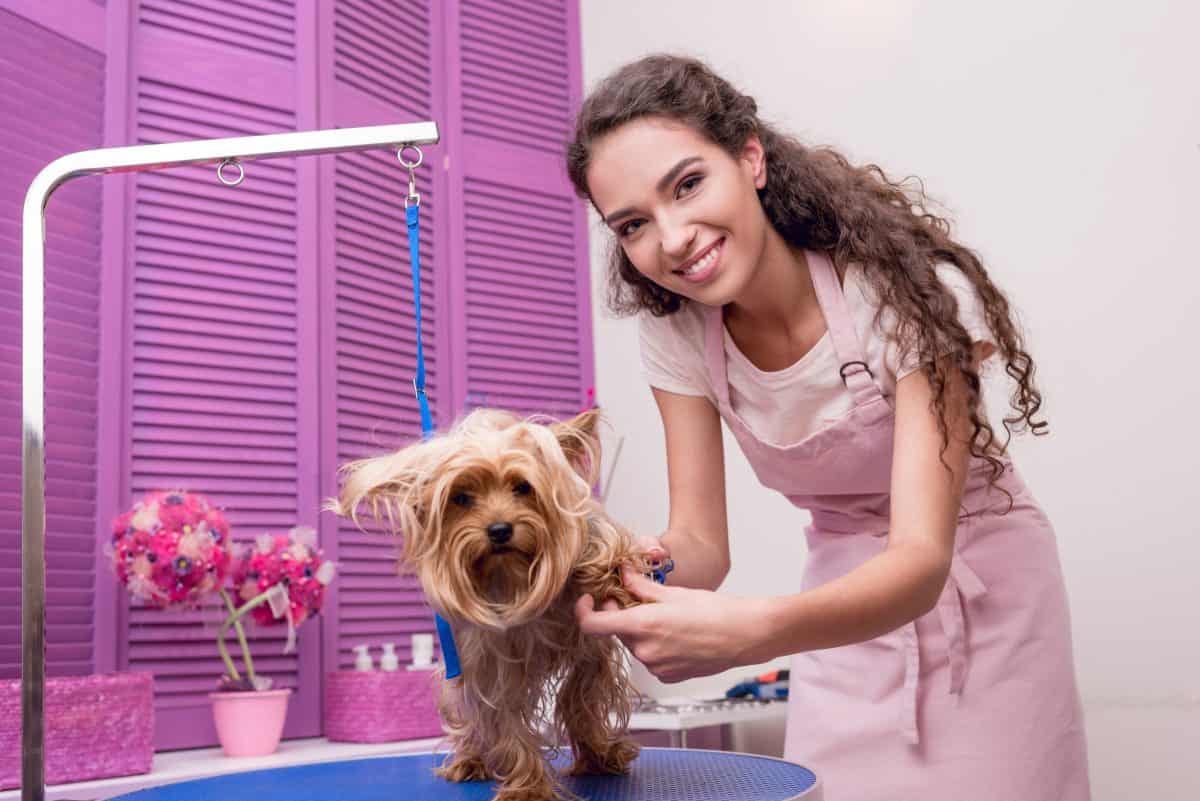How To Become A Dog Groomer

Interested in becoming a dog groomer? It’s a great option for animal lovers who want to work hands-on with pets and express their creativity through their work. While it’s challenging at times, it’s a fulfilling career path with plenty of opportunity for growth.
There are a lot of factors to consider when planning your career as a dog groomer. This guide will help you navigate all of those factors and help you make the most educated decision. Here’s what you need to know before becoming a dog groomer.
What Does a Dog Groomer Do?
No matter their position, dog groomers work hands-on with dogs to keep them looking and feeling good. In addition to styling, groomers tend to their clients’ dogs’ skin and coats to prevent issues like dry skin and matting. Oftentimes, groomers are the first to notice a lesion or growth on a dog, so their job is just as much about health as it is about appearance.
Most dog groomers fall into one of two categories:
Bather/Brusher
This type of groomer is responsible for maintaining the basic cleanliness and hygiene of their clients. They bathe dogs, dry them, brush their coats, brush their teeth, care for their nails, clean their ears, and do basic trimming as needed. These groomers typically get paid less than stylists, but many start off as bather/brushers and advance as they learn.
Groomer/Stylist
A stylist can do everything a bather/brusher does, but they also cut and style dogs’ coats in accordance with breed standards and owner preferences. Some even venture into creative grooming, utilizing dyes and unique styling techniques to turn their clients’ dogs into walking works of art.
Both types of groomers are also responsible for booking appointments, selling services, and communicating with clients, and maintaining a clean and safe work environment for both pets and people.
Dog Groomer Requirements & Qualifications
There are very few legal requirements for dog groomers, but as a groomer, you are responsible for the health and safety of the dog in your care. Because of this, it’s best to learn as much as you can about dog behavior, anatomy, and care before starting your career.
Dog Groomer Education
While no state currently requires a formal education for dog trainers, these options can help you gain the foundational knowledge and experience you need to do the job well. Each one has a different cost and have different lengths to get you into a grooming career.
Hands-On School (2-5 Months)
Several schools across the country offer hands-on dog groomer programs and certifications. In these programs, you learn the theory behind proper grooming and handling and you get to groom a wide variety of breeds. No other option provides such a comprehensive combination of classroom learning and practical experience.
Of course, each school is different, as are their grooming and handling methods. Research the programs in your area, and make sure to pick a school that aligns with your values and vision for your career.
Because hands-on schools offer such high quality education, they’re also the most expensive and time-consuming option. In the long run, though, groomers with formal training are more likely to land high-paying jobs in the field, so it’s worth the initial investment.
Mentorship (Timeline Varies)
Not everyone is able to attend school full-time. The next best option is to find a mentor within the industry and learn from them. Sometimes, you’ll work under your mentor as a paid employee who assists with basic grooming tasks, like bathing and brushing. Other times, you’ll work for free in exchange for education. This arrangement is entirely up to you and your mentor.
There is currently no network for dog groomers seeking mentees, so you will need to find a groomer who is willing to teach you. As with schools, different groomers use different methods and abide by different standards. Research groomers in your area, and seek a mentor whose values align with yours. Also, when working with a mentor, there are no guarantees as to the quality of your education. Be sure to choose someone whose expertise you trust.
Online School (6-12 Months)
If you don’t have access to or time to attend a hands-on school, you can opt for an online school. These programs allow you to learn from anywhere and at your own pace. Plus, many offer certifications to graduates.
The downside is that online programs don’t provide hands-on training. At best, you’ll be asked to practice on your own dogs and submit photos of your work for critique. At worst, there’s no interactive component whatsoever. If you choose to pursue online schooling, it’s best to supplement it with hands-on experience through mentorship or by volunteering at a shelter or rescue.
Self-Education (Timeline Varies)
If formal training isn’t an option, you can always educate yourself. There are plenty of free resources available to prospective groomers, like free online courses, seminars, video tutorials, and books. Since grooming trends are always changing, it’s recommended that even certified dog groomers continue their education throughout their careers.
Self-education is most popular among hobbyists, but there’s nothing stopping you from honing your skills and eventually becoming a professional groomer. It may just take longer to gain the hands-on experience necessary to take on your own clients.
Dog Groomer Certification
While no states currently require certifications, plenty of hands-on and online schools offer certificates to their graduates. These certificates act as proof of your skills and understanding of different breeds and coat types. Even if you don’t attend a school for your dog grooming education, you might pursue a certification to improve your odds of getting hired.
Dog Groomer License
Currently, there are no licensing requirements for professional groomers. Some states may require you to have a license to operate a grooming facility (even as a mobile or “freelance” groomer), but if you’re working for someone else, you don’t need to obtain any kind of license.
Personal Skills
Many dog lovers turn to grooming as a career so they can earn a living working with animals. While it is a great career for pet lovers, working with dogs also means working with their people. You’ll need to be able to communicate effectively with pet owners, addressing their concerns about their dogs and listening to their requests.
In some cases, you’ll need to have difficult conversations with clients, such as about matted dogs that need to be shaved or dogs that are too reactive to be groomed without sedation. As a groomer, you’ll need to show empathy and understanding for your clients as well as their pets.
In addition to people skills, dog groomers should be able to…
- Work on their feet for most of the day.
- Handle both large and small dogs.
- Keep their composure during stressful situations, such as with a reactive dog.
- Read and react appropriately to dog body language.
- Express their creativity through their work.
If you want to work with animals but you’re unsure if dog training is the right path for you, click here to explore other career options.
Finding a Job As a Dog Groomer
Once you complete your education, it’s time to move onto the next phase of your career. There are plenty of opportunities for dog groomers both in and out of the salon setting. You can see the diversity of grooming jobs on websites such as https://jooble.org/jobs-dog-groomer-apprentice.
How much do dog groomers make?
Dog groomers’ salaries vary widely based on their location, position, and specialty. The average salary for dog groomers in the US is $29,848 per year, but specialized groomers–for specific breeds or show dogs–might earn much more. Salon owners and independent groomers also have the capacity to earn much more depending on their business models.
Jobs for Dog Groomers
Typically, new dog groomers seek jobs at independently-owned or chain salons. Many start their careers as bather/brushers and become stylists after gaining some experience.
Most dog groomers settle into their careers in one of three places: a grooming salon, mobile grooming, or in a shelter or rescue. If you work for a salon or mobile grooming business, you’ll get to express your creativity in your grooms, try different styles for different breeds, and work directly with owners to find a happy medium between what they want for their pet and what the pet needs.
In a kennel, shelter, or rescue, your job will be less about style and more about health. You’ll most likely work with dogs coming from unfortunate conditions. It’s not glamorous work, but it’s incredibly rewarding to take a dog from matted and uncomfortable to healthy and adoptable.
Starting a Dog Grooming Business
Of course, you can also start your own dog grooming business. Many groomers see success working independently, either in their own salon or as a mobile groomer. Of course, to become a self-employed groomer, you also need business skills in addition to grooming experience. You’ll need to learn how to manage your client base, your finances, and your marketing. It’s a major commitment, but it’s very common in the industry.
Want to become a dog groomer? Take the first step today!
Our hands-on program is designed to provide you with the classroom and practical education you need to jumpstart your dog grooming career. Complete the form below for more information, or to book a tour of our Missouri facility.
 Author - Joseph Schifano
Author - Joseph Schifano
Joseph Schifano is the owner and President of The Academy of Pet Careers. With over 20 years of experience working in the pet field, managing large scale pet care businesses, he has experience in every facet of the industry. Joseph's focus is primarily on the business of pet care but his passion is in understanding animal behavior how a dog's brain works so we can improve the care we provide as pet professionals. He is a huge advocate for Pet Empowerment and Force Free training methods. Read more in Joseph's full bio.
